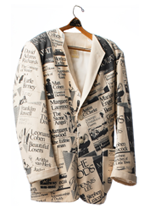Alberto Manguel and Louise Dennys: An Editing Match
John Shoesmith, University of Toronto
The editor has been a staple of the North American literary landscape since the early twentieth century, with the stature and importance of the profession growing considerably in the last half century. It’s generally acknowledged that the legendary Maxwell Perkins defined the role of the modern editor. While working at Charles Scribner and Sons from the early 1910s to the 1940s, he edited the writings of such literary lions as Ernest Hemingway, F. Scott Fitzgerald, and Thomas Wolfe. His influence on all the writers he worked with, not to mention American literature in general, cannot be underestimated.
Yet, the editor is not universally beloved by all writers. Esteemed Canadian 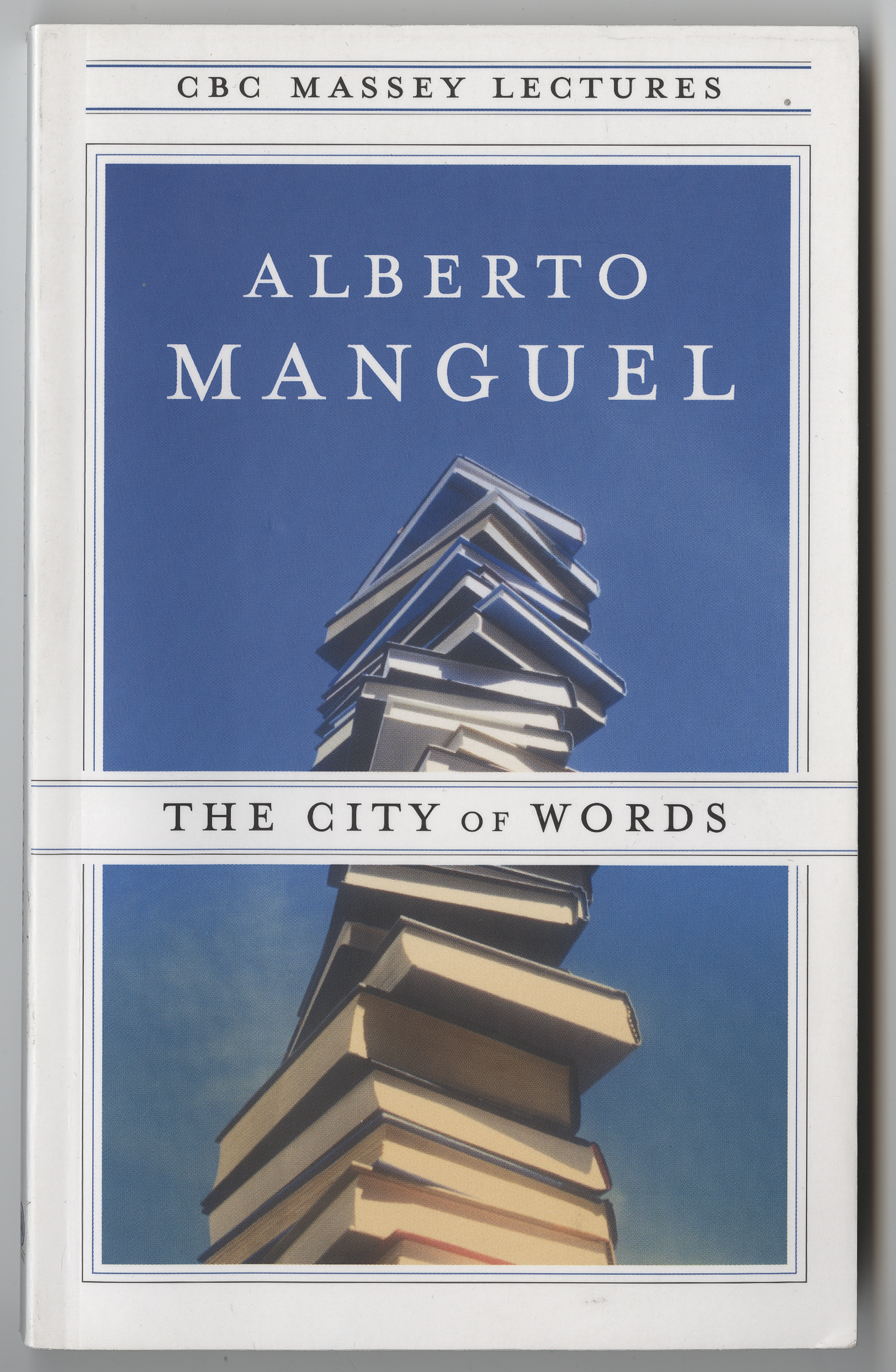 author and anthologist Alberto Manguel, for example, had some disparaging words on the editing process in his final reading at the 2007 Massey Lectures, delivered at University of Toronto’s Massey College and published as The City of Words by the House of Anansi Press. He referred to editing as “industrial manipulation,” the result of the idea and precept that a literary text is perfectible. “That is to say that writing must aspire to a kind of Platonic archetype, an ideal model of literary text,” he writes. “It follows then that this ideal can be attained with the help of a specialist, an editor acting as tuner or mechanic who can ‘perfect’ the text through professional reading skills.” As a result, he maintains that writing is the one art form where an intermediary – the editor – sits between artist and reader. He ends his screed quoting Anthony Burgess: “Why should the novelist be singled out as the one artist who doesn’t understand his art?”
author and anthologist Alberto Manguel, for example, had some disparaging words on the editing process in his final reading at the 2007 Massey Lectures, delivered at University of Toronto’s Massey College and published as The City of Words by the House of Anansi Press. He referred to editing as “industrial manipulation,” the result of the idea and precept that a literary text is perfectible. “That is to say that writing must aspire to a kind of Platonic archetype, an ideal model of literary text,” he writes. “It follows then that this ideal can be attained with the help of a specialist, an editor acting as tuner or mechanic who can ‘perfect’ the text through professional reading skills.” As a result, he maintains that writing is the one art form where an intermediary – the editor – sits between artist and reader. He ends his screed quoting Anthony Burgess: “Why should the novelist be singled out as the one artist who doesn’t understand his art?”
Manguel’s attitude, however, is tempered by his obvious affection for his own editor, someone he describes as “having taught me to write; it would be unconscionable of me not to state publicly how much I owe to her intelligence, intellectual rigour, and personal taste.” That woman is long-time editor and publisher Louise Dennys.
Dennys has been a fixture on the Canadian literary scene since arriving in Canada from England in the early 1970s. She began her career at the publisher Clarke, Irwin, first as an editorial assistant and later as editor, and then formed a partnership with Toronto antiquarian bookseller Hugh Anson-Cartwright that saw the publication of five books, including The Bass Saxophone by Josef Škvorecký. In 1978, she joined the firm of Lester & Orpen – later to become Lester & Orpen Dennys – where she helped shepherd books by such noted authors as Graham Greene (who is also Dennys’s uncle), John Irving, 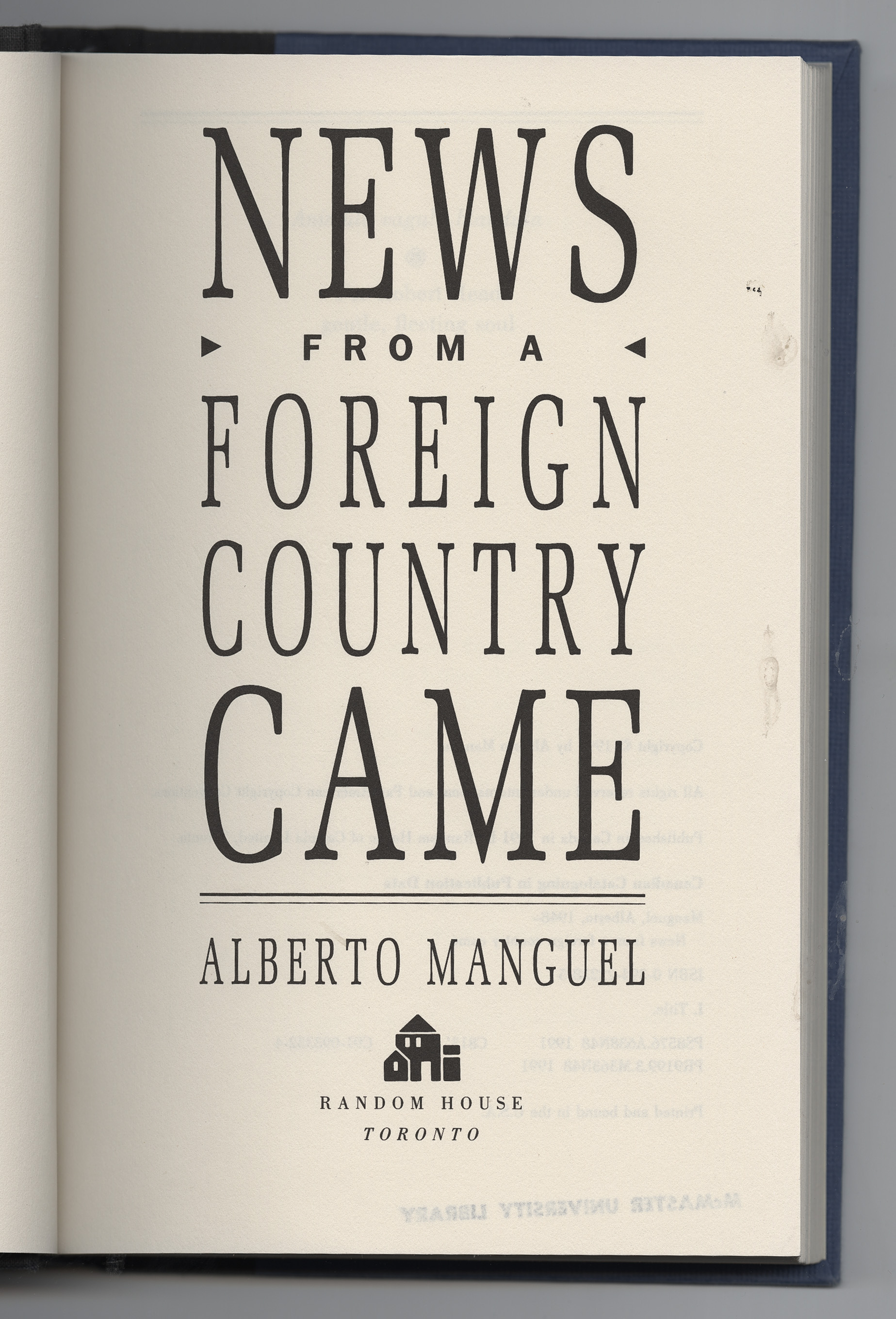 and Don DeLillo. When the firm merged in the early 1990s with Key Porter, she moved to Alfred A. Knopf Canada, where she currently serves as executive publisher; she is also executive vice president of Random House of Canada.
and Don DeLillo. When the firm merged in the early 1990s with Key Porter, she moved to Alfred A. Knopf Canada, where she currently serves as executive publisher; she is also executive vice president of Random House of Canada.
While Dennys has been Manguel’s editor since the late 1980s – she helped shape his first novel News From a Foreign Country Came and his classic A History of Reading – one can view her influence on him via her editing of A Reading Diary (Alfred A. Knopf Canada, 2004). Subtitled “A Year of Favourite Books,” A Reading Diary chronicles a year in Manguel’s life, with 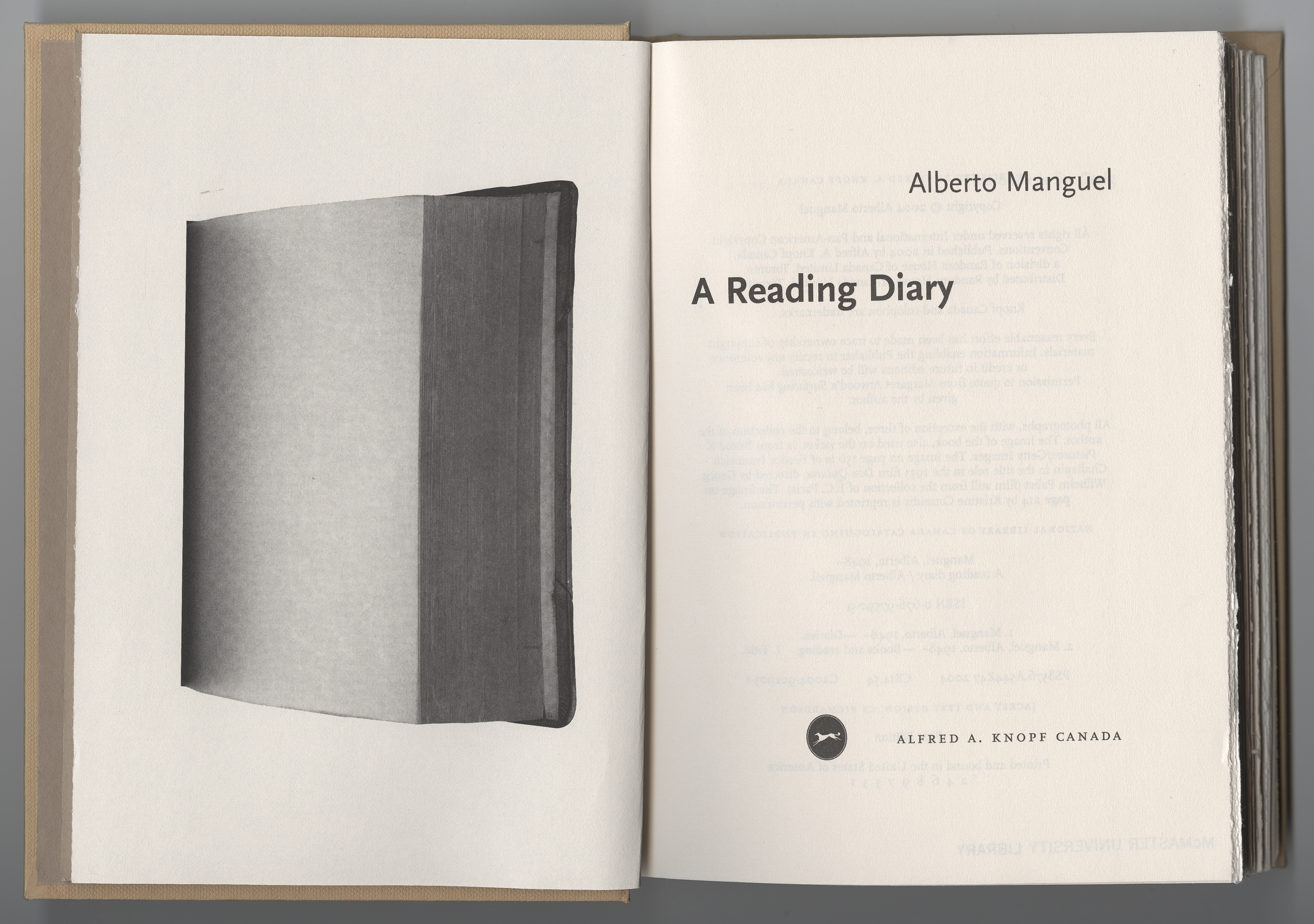 each month focusing on a specific book. It begins, in June 2002 with his re-reading of Casare’s The Invention of Morel, and ends in May 2003 with The Posthumous Memoirs of Brás Cubas by Joaquim Maria Machado de Assis. Manguel delivered the 194-page manuscript to Dennys in the fall of 2003.
each month focusing on a specific book. It begins, in June 2002 with his re-reading of Casare’s The Invention of Morel, and ends in May 2003 with The Posthumous Memoirs of Brás Cubas by Joaquim Maria Machado de Assis. Manguel delivered the 194-page manuscript to Dennys in the fall of 2003.
Her editing takes two forms: a seven-page “memo” (written, interestingly, as an e-mail but sent as a letter to Manguel; he does not use e-mail) and the line editing of the manuscript itself. Her memo represents the substantive edit, outlining her thoughts about the manuscript as a whole – “I was delighted to find it really is a diary!” – while offering guidelines on how the work can be improved by examining specific aspects of the manuscript, including structure, themes, and stylistic issues. She strives for a delicate balance: to be both supportive and tough, to trumpet the author’s hard work, but also to temper his enthusiasm with suggestions for improvement. Often, she accomplishes the feat within the same sentence: “So what still needs care? Well, it seems to me that, as is often the case, this same generous, joyful quality also contains some ‘flaws’ – flaws that you can easily address.”
The most obvious flaw for Dennys, one that Manguel does address in subsequent drafts, is the lack of storytelling, which she suggests can be resolved by developing a “sense of progress,” by setting the book more in the present. This idea is displayed more obviously in Dennys’s line edit. While much of her editing is stylistic, including copy edits, she draws out many of her more general comments within the margins of the manuscript.
Examining the treatment of one chapter is useful way to study Dennys’s role, particularly if one examines a “problematic” section, such as the November chapter focusing on Goethe’s Elective Affinities which, Dennys admits in her general notes, “never gels for me as a reader.”
Her editing within this chapter is aggressive, beginning with the opening paragraph where she subtly shifts phrases and adds words to alter a passage she views as awkward. In the original manuscript, the paragraph reads:
I’m in Calgary for a short visit. The city seems to have extended itself like an unstoppable growth in the past few years, allotment after identical allotment, horrible imitations of the American Mid-Western model, crowded monstrosities with no urban heart – no squares, no schools, no churches, no small shops. What kind of communication can take place in communities like these?
After Dennys’s suggestions and rewrites, the paragraph becomes:
I’m in Calgary for a short visit, to attend a conference at the Banff Centre for the Arts. The city seems to have extended itself in the past few years, allotment after identical allotment, an unstoppable growth, a horrible imitation of the American Midwestern model made up of crowded monstrosities with no urban heart – no squares, no schools, no churches, no small shops. What kind of dialogue or communication can take place in communities like these?
While some of Dennys’s margin notes are affirmations of the strength of the text – “how lovely and moving” she writes of Manguel’s description of Goethe’s prose – she also continually attempts to cajole Manguel into improving the text and the overall story-telling element of the book. For example, on manuscript page 100, she queries Manguel about whether he’s able to craft “a more interesting introduction” before he launches into a discussion on a section of the Goethe book where two characters discuss architecture. Manguel runs with this suggestion: in the book, that particular section begins with a charming story of Manguel’s own architect who supervised the building of his library. It points to an editor’s sixth sense that something is missing, and demonstrates the editor’s confidence in the writer to deliver something better.
Dennys also cautions Manguel within this chapter to resist becoming “too referential in academic fashion,” calling such sections of the manuscript weak and dull. To that end, and to make the manuscript more reader-friendly, she cautions against approaching Goethe’s text from a literary criticism perspective. Again, the changes she suggests are small and subtle, but effective: using phrases like “a little later in the book,” rather than the more cumbersome “for instance, the end of Part One, Chapter Eleven…” Dennys’s editing helps to humanize the work, improving its accessibility.
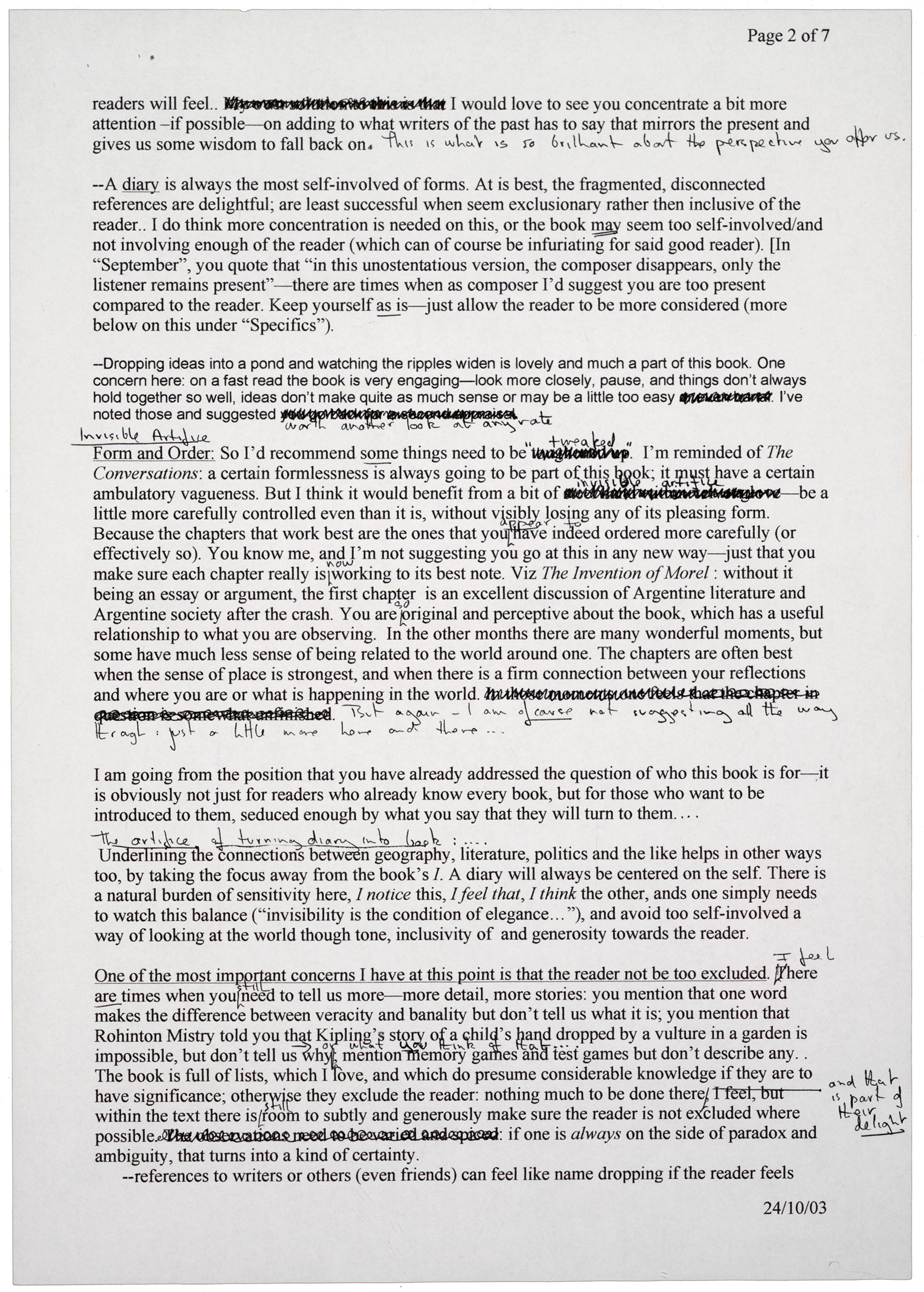 Manguel’s A Reading Diary benefits greatly from the astuteness and intelligence of Dennys’s edits. Still, no matter how respected an editor is to the writer, it’s the writer who often has the final word on the text. Manguel and Dennys are no exception. On the final page of the manuscript, Dennys writes, “While the last line is beguiling, the ending as a whole lacks strength & immediacy. The penultimate paragraph is vital and beautiful – but all told we don’t put the book down with the sigh we might wish to, or joy we might expect given much that has gone before.” Manguel, however, keeps the last line intact.
Manguel’s A Reading Diary benefits greatly from the astuteness and intelligence of Dennys’s edits. Still, no matter how respected an editor is to the writer, it’s the writer who often has the final word on the text. Manguel and Dennys are no exception. On the final page of the manuscript, Dennys writes, “While the last line is beguiling, the ending as a whole lacks strength & immediacy. The penultimate paragraph is vital and beautiful – but all told we don’t put the book down with the sigh we might wish to, or joy we might expect given much that has gone before.” Manguel, however, keeps the last line intact.
Note: To hear an interview with Louise Dennys conducted by Roy MacSkimming for his book, The Perilous Trade, click here.
“Women in the Canadian Book Trade: Louise Dennys.” Library and Archives Canada. http://www.collectionscanada.gc.ca/women/002026-283-e.html
Manguel, Alberto. Personal website: http://www.alberto.manguel.com/
Alberto Manguel Papers, Thomas Fisher Rare Book Library, University of Toronto
